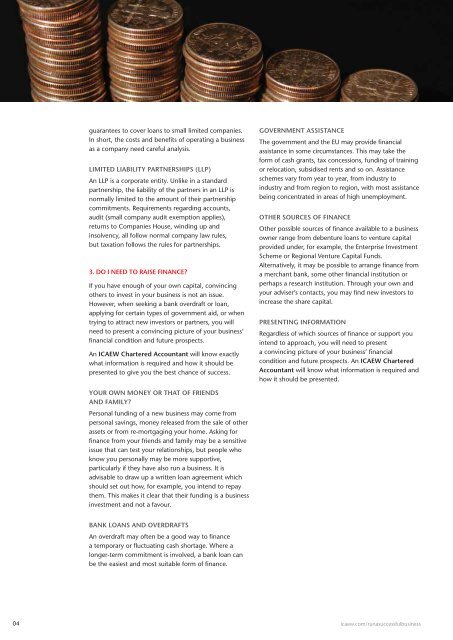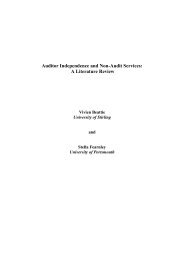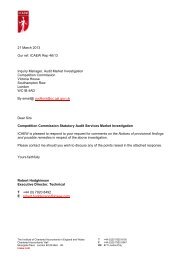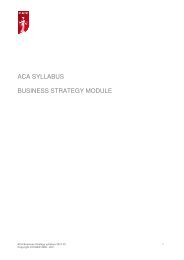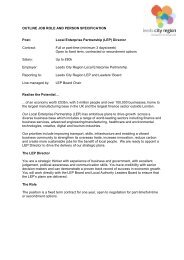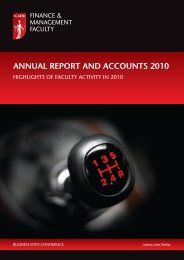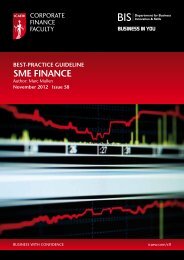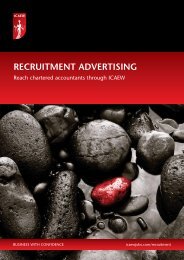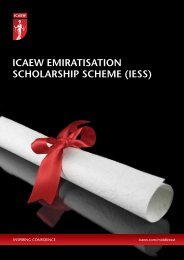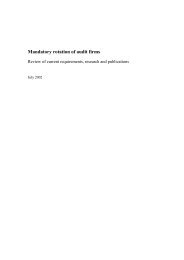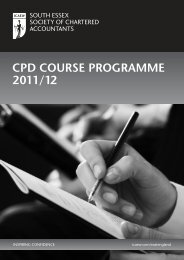RUN A SUCCESSFUL BUSINESS - ICAEW
RUN A SUCCESSFUL BUSINESS - ICAEW
RUN A SUCCESSFUL BUSINESS - ICAEW
You also want an ePaper? Increase the reach of your titles
YUMPU automatically turns print PDFs into web optimized ePapers that Google loves.
guarantees to cover loans to small limited companies.<br />
In short, the costs and benefits of operating a business<br />
as a company need careful analysis.<br />
LIMITED LIABILITY PARTNERSHIPS (LLP)<br />
An LLP is a corporate entity. Unlike in a standard<br />
partnership, the liability of the partners in an LLP is<br />
normally limited to the amount of their partnership<br />
commitments. Requirements regarding accounts,<br />
audit (small company audit exemption applies),<br />
returns to Companies House, winding up and<br />
insolvency, all follow normal company law rules,<br />
but taxation follows the rules for partnerships.<br />
3. DO I NEED TO RAISE FINANCE?<br />
If you have enough of your own capital, convincing<br />
others to invest in your business is not an issue.<br />
However, when seeking a bank overdraft or loan,<br />
applying for certain types of government aid, or when<br />
trying to attract new investors or partners, you will<br />
need to present a convincing picture of your business’<br />
financial condition and future prospects.<br />
An <strong>ICAEW</strong> Chartered Accountant will know exactly<br />
what information is required and how it should be<br />
presented to give you the best chance of success.<br />
GOVERNMENT ASSISTANCE<br />
The government and the EU may provide financial<br />
assistance in some circumstances. This may take the<br />
form of cash grants, tax concessions, funding of training<br />
or relocation, subsidised rents and so on. Assistance<br />
schemes vary from year to year, from industry to<br />
industry and from region to region, with most assistance<br />
being concentrated in areas of high unemployment.<br />
OTHER SOURCES OF FINANCE<br />
Other possible sources of finance available to a business<br />
owner range from debenture loans to venture capital<br />
provided under, for example, the Enterprise Investment<br />
Scheme or Regional Venture Capital Funds.<br />
Alternatively, it may be possible to arrange finance from<br />
a merchant bank, some other financial institution or<br />
perhaps a research institution. Through your own and<br />
your adviser’s contacts, you may find new investors to<br />
increase the share capital.<br />
PRESENTING INFORMATION<br />
Regardless of which sources of finance or support you<br />
intend to approach, you will need to present<br />
a convincing picture of your business’ financial<br />
condition and future prospects. An <strong>ICAEW</strong> Chartered<br />
Accountant will know what information is required and<br />
how it should be presented.<br />
YOUR OWN MONEY OR THAT OF FRIENDS<br />
AND FAMILY?<br />
Personal funding of a new business may come from<br />
personal savings, money released from the sale of other<br />
assets or from re-mortgaging your home. Asking for<br />
finance from your friends and family may be a sensitive<br />
issue that can test your relationships, but people who<br />
know you personally may be more supportive,<br />
particularly if they have also run a business. It is<br />
advisable to draw up a written loan agreement which<br />
should set out how, for example, you intend to repay<br />
them. This makes it clear that their funding is a business<br />
investment and not a favour.<br />
BANK LOANS AND OVERDRAFTS<br />
An overdraft may often be a good way to finance<br />
a temporary or fluctuating cash shortage. Where a<br />
longer-term commitment is involved, a bank loan can<br />
be the easiest and most suitable form of finance.<br />
04<br />
icaew.com/runasuccessfulbusiness


